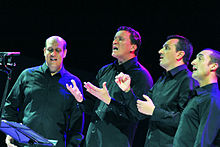- Music of Corsica
-
Music of France Styles classical - folk - popular: hip hop - jazz - rock History Awards NRJ Music Awards - Victoires de la Musique Charts IFOP Festivals Printemps de Bourges - Eurockéennes de Belfort Media National anthem "La Marseillaise" Regional music Auvergne - Aquitaine - Pays Basque - Brittany - Burgundy - Corsica - Gascony - Limousin Overseas music French Guiana - French Polynesia - Martinique and Guadeloupe - Mayotte - New Caledonia - Réunion - Tahiti - Wallis and Futuna Outside of France, the island of Corsica is perhaps best known musically for its polyphonic choral tradition. The rebirth of this genre was linked with the rise of Corsican nationalism in the 1970s. The anthem of Corsica is "Dio vi Salvi Regina".
Every June, Calvi is home to an International Jazz Festival and in September there are the annual Rencontres de Chants Polyphoniques.
Contents
Folk music
Dance
There are two dances of ancient origin found in Corsica: the caracolu, a women's funeral dance, and the moresca, illustrating the struggle between Moors and Christians. These days, they're not danced anymore. Traditional dances like the quatriglia (quadrille) or the scuttiscia (scottish) have known some kind of revival over the last twenty years, groups like Diana di L'alba and Dopu Cena recorded the music and the associations Tutti in Piazza and Ochju à Ochju animate dance nights and teach as well. The granitula, a spiral procession, is still performed by the confraternities on Good Friday.
Monophonic song
The oldest vocal forms include voceri (sing. voceru) laments for the dead usually improvised by women; bandits' laments; laments for animals; lullabies; songs of departure; tribbiere (sing. tribbiera) or threshing songs); songs of mule-drivers; chjam' è rispondi (‘call and response’, a contest in improvised poetry); the currente (e.g. greeting guests; these have a distinctive fiddle accompaniment) and the cuntrastu (an exchange between a young man and woman).
Polyphonic song
Polyphonic songs (pulifunie) in Corsica are a cappella, and can be either spiritual or secular. Hymns, motets, and funereal songs (lamentu) are an example of the former, while the nanna (lullaby) and the paghjella are examples of the latter. Traditionally, 4 to 6-voice improvised polyphony was sung only by men, with the exception of the voceru (sung only by women) and cuntrastu (usually 2-voice) and nanne often sung by women. Brotherhoods of polyphonic singers (cunfraternita) remain, some dating back to the 12th century. Corsica's actual tradition of improvised vocal polyphony is more recent, dating to 15th century. It is traced to renaissance practice of falso bordone and the Genoese tradition of Trallalero.
The tradition of Corsican polyphonic singing had nearly become extinct until its revival (riaquistu) in the 1970s. It is now a central part of Corsican national identity, and is sometimes linked with political agitation for autonomy or independence.
Some popular modern groups include the Palatini, A Filetta, Terra, Voce di Corsica, Alte Voce, Barbara Furtuna, Vaghjime, Cinqui So', all-female Donninsulana, Les Nouvelles Polyphonies Corses, Tavagna, Canta u Populu Corsu and I Muvrini. The region of Balagne has emerged as a hot spot for Corsican music, producing groups like U Fiatu Muntese. Some more recent successful groups are
Traditional instruments
The cetera, a cittern of 4 to 8 double strings that is of Tuscan origin and dates back to the Renaissance, is the most iconic Corsican traditional instrument. Its most prominent exponent is Roland Ferrandi (also a lutenist).
- Caramusa - a bagpipe made of wood, leather and reed
- Cialamedda (also cialamella/cialambella) - formerly a reed instrument, more recently with a wooden box body
- Mandulina - a mandolin
- Pirula - a reed recorder
- Pifana (also pivana) - a type of gemshorn generally made from a goat horn
- Riberbula - related to the jaw harp
- Sunaglieri - mule bells
- Timpanu - a triangle
- Urganettu - a diatonic accordion
External links
- BBC Radio 3 Audio (105 minutes): Corsica and Sardinia. Accessed November 25, 2010.
- L'Invitu: informative site about all aspects of Corsican music.
- Félix Quilici, l'homme à l'écoute: interesting documentary about the man who first started collecting traditional Corsican music (the "Corsican Alan Lomax") - in French.
References
- Cantu Nustrale, Ghjermana de Zerbi - Albiana, 2009
Categories:- Music of French subdivisions
- Corsica
- Corsican music
Wikimedia Foundation. 2010.

